Here are five ways you can go plastic free for July and hopefully beyond. As School holidays are coming up we’ve
included some fun school holiday activities.
Plastic can take hundreds of years to degrade, leaving a huge impact on our environment.
That is why we’re inviting you to take the challenge of going plastic free this July, because positive change
starts with you!
Start with a few actions and build on from there, every small change makes a difference.
Plastic Free July challenges participants to avoid using single use plastics wherever possible, and encourages users to change their habits.

1. AVOID
- Plastic bags – it’s time to bag the plastic bag! Although it may be seen as a necessary
convenience, it certainly isn’t convenient when it comes to the huge environmental issues caused by plastic
bags that end up littered and in our waterways and ocean.
Avoid single use shopping bags and choose reusable shopping bags made from jute, bamboo, cotton or PET instead.
TIP: Store your re-usable enviro bags in your car so that you don’t forget them on your next visit to the shops.
There are also compact, foldable options that can fit easily in your handbag and also come in key ring
sizes.
If you forget your bags, ask the shop assistant for a cardboard box to store your groceries in.
- Avoid using plastic produce bags for your fruit and veg. There are many reusable
produce bags now available such as Rethink fresh produce
bags, Onya
Reusable Mesh Produce Bags or ChicoBag. You may even consider making your own. Remember to place them with your reusable shopping bags so they
are ready to use again.
- Polystyrene – expanded polystyrene includes cups, meat trays and packaging cannot be
recycled through kerbside recycling. For more information on how you can avoid polystyrene click
here.
- Pre-packaged fresh fruit and vegetables. Choose loose, save waste and usually money too.
You generally will be paying more, by weight, when you buy pre-packed fruit and veg. A prepared package of
cut up fruit, for instance, usually costs at least twice as much as whole fruit you can cut up yourself. If
you buy produce from a farmer’s market, you will probably save 50% more.
- Individually packaged/wrapped food items. Bring your reusable containers and purchase food
from a bulk food store, or the bulk food section at your local supermarket or fruit and veg store. Why not
make your waste free, healthy and delicious snack food, get the kids involved and they
will be more likely to eat them too. You will save waste and money too!
- Purchasing items with excess packaging. Source items with minimal packaging that is
recyclable or made from recycled materials.
- Personal care products that contain microbeads. In December 2016, an official meeting of
environment ministers (MEM) from federal, state and territory level across Australia endorsed a voluntary
industry phase-out of
microbeads by 1 July 2018.
- Pre-packed meat and fish – Support your local butcher or fishmonger and bring
your own reusable container or request cuts to be wrapped in paper.
- Plastic straws – Politely refuse them at the counter when purchasing a drink and encourage
your local café to stop supplying plastic straws or provide alternative paper or even pasta straws.
Purchase reusable stainless steel
straws and keep one in your bag for when you go out.
- Takeaway coffee cups – Avoid drinking from a takeaway cup as well as the takeaway queue
and treat yourself to a barista-made coffee, at a table, in a warmed ceramic cup. Why not have that work
meeting that you’re rushing to, at the coffee shop so that everyone can enjoy the experience of drinking
from a warm cup and some time out of the office?
- Takeaway plastic cutlery, use reusable or compostable alternatives made from
PLA/corn-starch or bamboo.
- Plastic takeaway containers – choose takeaway items that don’t come in a plastic container eg. Pizza or other cardboard or paper wrapped items that can be composted (if soiled) or recycled (if
clean). Take your own containers to your takeaway shop or restaurant to bring home any left-overs in.
- Plastic cling wrap – use reusable containers or beeswax wraps. Make your own beeswax wraps, a great school holiday activity to do with the kids.
- Using coffee pod machines. Pods are made from plastic and aluminium and are difficult to
recycle. It is estimated that 3 million pods are ending up in landfill every day in Australia. Click here for
more information on how to kick your coffee pod habit.
- Bottled soft drink – save on cavities and calories as well as waste. If you can’t do
without your bubbly sugary fix, consider making your own with a Sodastream or only choose softdrinks in
cans or glass bottles.
- Plastic bin liners, use newspaper to line your bin instead. Click here for instructions on
how you can do this. You may also consider using compostable bags instead such as Biobag or Compostapak brands. Beware of biodegradable
bags as these are usually still plastic and simply break up into tiny pieces of plastic.
- Single use, disposable coffee cups are NOT recyclable through the yellow lid recycle bin. They are lined with plastic and/or wax which is very difficult to separate from the paper. They are also contaminated with coffee and milk residue.
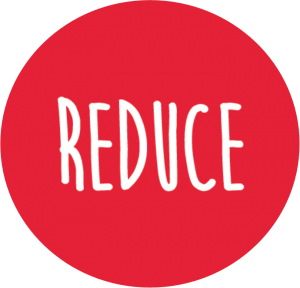
2. REDUCE
- Bottled cleaning products. Purchase products from bulk stores using your refillable
containers, use soap bars including shampoo bars instead. Make your own cleaning products – another a great
school holiday activity to get the kids involved in! Choose products in cardboard, paper or glass packaging instead.
- The amount of things you buy – especially plastic, by making a list and planning to buy
only what you really need.
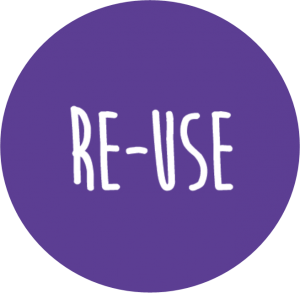
3. REUSE
Choose to re-use
- Use a refillable water bottle. You will be saving a considerable amount of money as
well as plastic! Australian consumers pay almost 2000 times more for bottled water than for tap
water.
- Use a re-usable, non–disposable coffee cup. The best option is to choose to refuse single-use takeaway cups and choose reusable instead! Avoid takeaway coffee cups by bringing along your own reusable alternative. There are many reusable coffee cups available on the market. Keep it in your bag or on your desk at work; wherever you’ll remember to use it. Many people choose socially and environmentally-friendly reusable cups made from ceramic, glass, plastic or stainless steel.You don’t even need to purchase a special cup. Simply use a mug or jar from home!
Find your nearest cafe that will welcome your reusable coffee cup here: Plastic Free SA or Responsible Cafes.
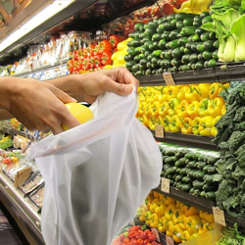 Many grocery stores pre-package their fruit and vegetables in plastic, and offer plastic bags for loose items. Look out for loose fruit and vegetables in your local grocery store, or head to a farmers market or bulk food store where plastic packaging is less often used.
Many grocery stores pre-package their fruit and vegetables in plastic, and offer plastic bags for loose items. Look out for loose fruit and vegetables in your local grocery store, or head to a farmers market or bulk food store where plastic packaging is less often used.
Use your own reusable produce bags made from recycled plastic or repurposed netting fabric. You can easily make your own!
Alternatively use certified compostable or paper bags. These are now often available in many supermarkets, farmers markets and bulk food stores. If your local supermarket is supplying these plastic free options, make a point of acknowledging this by thanking them and posting something on social media. Giving positive customer feedback is an effective way to make sure plastic free options remain at your store.
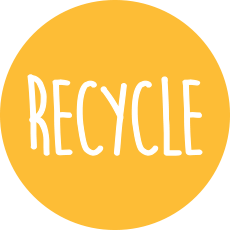
-
4. RECYCLE
- Recycle your rigid plastic containers and packaging. Most hard plastics coded 1-7 can be
recycled in your yellow lidded recycling bin except for expanded polystyrene foam #6. Click here for more information about what plastics can and cannot be recycled.
- Purchase products that use recycled plastic eg. a recycled plastic mobile phone cover.
- Encourage your Council and school to purchase outdoor furniture and play equipment made from
recycled plastic.
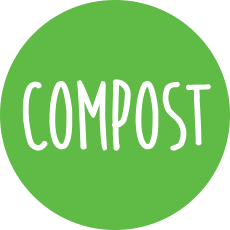
5. COMPOST
So now you are have a list of ways to do it, why not register your commitment on the Plastic Free July website!
Click here to register and learn
more about Plastic Free July on the Plastic Free
July website.




 Many grocery stores pre-package their fruit and vegetables in plastic, and offer plastic bags for loose items. Look out for loose fruit and vegetables in your local grocery store, or head to a farmers market or bulk food store where plastic packaging is less often used.
Many grocery stores pre-package their fruit and vegetables in plastic, and offer plastic bags for loose items. Look out for loose fruit and vegetables in your local grocery store, or head to a farmers market or bulk food store where plastic packaging is less often used.

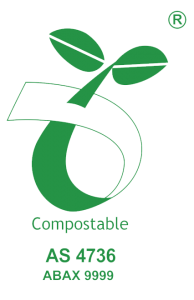 Compostable items are made from plant based materials such as
corn-starch and offer a great alternative to plastic. In order to be classified as compostable they must meet
the Australian Standard for compostability AS-4736 and will have this symbol.
Compostable items are made from plant based materials such as
corn-starch and offer a great alternative to plastic. In order to be classified as compostable they must meet
the Australian Standard for compostability AS-4736 and will have this symbol.